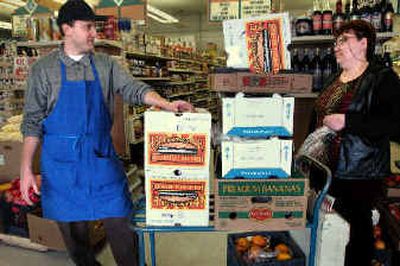Ukrainian immigrants watch drama from afar

At the Kiev Market, between the rows of sesame calach and Ukrainian chocolates, talk this week has inevitably turned to the protests a world away.
Nick Grishko, the store’s 31-year-old owner, has marveled at the sheer number of people braving the December cold in Kiev’s Independence Square.
“All night,” Grishko said, smiling. “Tens of thousands of people. People are there for their freedom. They are moving toward democracy.”
For Grishko and others in Spokane’s Ukrainian population, their country remains a mystery to most Americans, a footnote in a nation of immigrants.
But now the world’s eyes are on this formerly communist country, and each day Grishko and others open newspapers to read stories from Kiev and watch headlines crawl across television screens.
On Wednesday, Grishko celebrated the news that Ukraine’s Parliament had passed a resolution of no confidence in Prime Minister Viktor Yanukovych, who claimed victory in last month’s election despite allegations of widespread voter fraud.
“Wow,” Grishko said after hearing the news. “I’m very happy. In a democracy, everything must be clear.”
After the collapse of the Soviet Union, thousands of people from Russia and Ukraine came to Spokane County. From 1990 to 2000, the population of former Soviet residents in the city of Spokane alone grew from 1,000 to nearly 5,000, according to census numbers.
Even though their children quickly merged into American culture, many remain close to their homeland.
“I’ve racked up quite a bill talking on the phone,” said Gregori Senchenko, a 30-year-old court interpreter.
Senchenko said his friends in Kiev have taken tents and sleeping bags to the streets to protest the election.
“They come home for a couple hours, and then they go back,” said Senchenko, who left Ukraine in 1989, before the collapse of the Soviet Union. “They are very determined. Anybody I call, they are on the streets.”
Almost immediately after the Nov. 21 elections, Grishko began to hear complaints from friends and family in Ukraine. One friend, a member of a committee assigned to oversee voting fraud, told him she was shocked to see her vote had been changed from opposition leader Viktor A. Yushchenko to Yanukovych.
Grishko said that a friend’s brother had been paid to ride a bus around the country, casting dozens of votes for Yanukovych.
On election day, Yelena Skripnik and her husband drove his parents in Smilia to a polling place. The radio buzzed with reports of fraud and violence, but Skripnik said they saw no problems. However, when the results were reported, she said she was shocked to see that Yanukovych had been declared the winner.
“Our people wanted Yushchenko,” said Skripnik, now back in Spokane. “They voted for Yushchenko. But Yanukovych wins. The people know what the truth is. They want the truth.”
Skripnik came to the United States 11 years ago, fearing that her children would face persecution for their Christian beliefs. She said an uncle had spent two years in prison for allowing children into his church.
She fears Yanukovych might resurrect religious persecution in the country.
“We were afraid for our children,” she said. Now, she must “wait and see. We worry. It’s our country too.”
On Wednesday morning, Pavel Kobzar, a 25-year-old truck driver, stopped by the Kiev Market for a bottle of a Russian nonalcoholic malt drink.
Kobzar worried that Yanukovych – who had won the support of Russia – would only serve as a yes man to the Moscow government. He said the crowds in the square showed that the Ukrainian people want to align themselves with Western governments.
“We have never seen anything close to this,” Kobzar said. “People did not stand outside in the cold for a week.”
Grishko concurred. Much has changed since he left Ukraine 12 years ago, when many stores were unable to stock food.
In July, Grishko returned with members of his church to visit an orphanage. He saw hundreds of homeless children without shelter, but in the orphanage he saw signs of hope.
He draws a connection between the children on the street and the current political turmoil. Those children will grow up under a government that either looks to Russia or to the West.
“Ukrainians stand at a crossroad,” he said. “Either they go toward democracy, or they go toward this communist-type system. This day is crucial.”